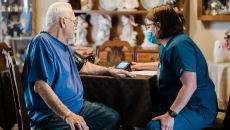Telehealth
Dr. Lyle Berkowitz, CEO of just-launched KeyCare, talks about how contracting with a third-party telehealth service works, the importance of the Epic link – and where he thinks virtual care is headed next.
Due to the extreme stressors of COVID-19, career disengagement characterizes a U.S. physician workforce already in short supply, the group says, calling for telehealth expansion and prior auth reforms.
The European Health Data Space, hopes for a Senate telehealth bill passage, public health infrastructure modernization and more are all on the group's agenda, says Tom Leary, HIMSS senior VP and head of government relations.
The partnership adds virtual visits within the electronic health record platform and aims to help reach vulnerable patients requiring healthcare at home.
Digital innovation and policy changes at the U.S. Department of Veterans Affairs are improving access to healthcare for veterans and their families, says Jim Gfrerer, former CIO at the VA, who shares some predictions about the future of healthcare.
A three-time survey of 1,300 physicians from 2016-2022 revealed growing recognition of technology's benefit, with the biggest growth seen in remote care tools and planning for digital therapeutics.
People with disabilities often are faced with higher rates of chronic conditions and experience a higher rate of financial difficulty covering the costs of care.
Low-touch digital apps and high-touch telehealth don't fully address the lack of capacity in behavioral health – VR can, says one psychologist, who explains how.
Also, Te Whatu Ora New Zealand is setting up a clinical and consumer council to advise on data and digital health projects in the country.
"We have learned more about the huge technological and digital access barriers that many of our rural patients face," the director of patient engagement at Community Health Center of Southeast Kansas says.









